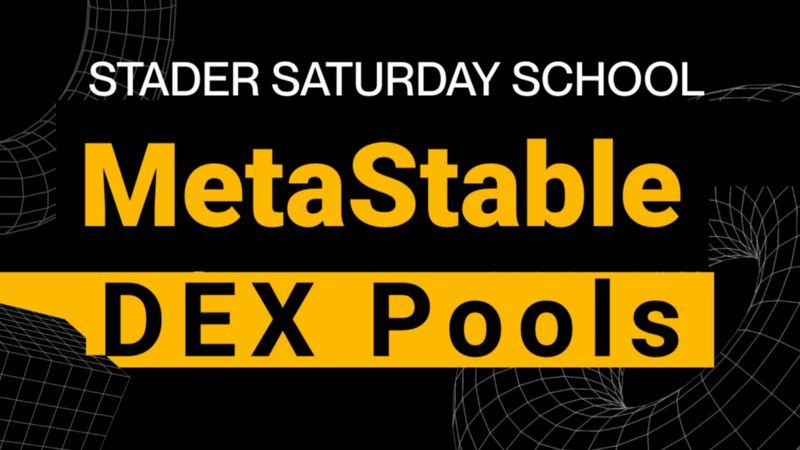MetaStable DEX Pool
Before we begin talking about MetaStable DEX Pools, let us understand what a Stable pool is. Stable pools are of immense benefit for both…

Before we begin talking about MetaStable DEX Pools, let us understand what a Stable pool is. Stable pools are of immense benefit for both crypto traders and liquidity providers. These pools are designed for assets expected to trade consistently at near parity. It is used for various stablecoins and even synthetics.
What are Stable Pools?
Stable pools make use of Stable Math, which is based on StableSwap. This allows for a comparatively more significant amount of trades before a massive impact of price change. Thereby increasing the capital efficiency of like-kind swaps of assets.
Hence, no doubt that traders enjoy the tighter spreads and the lower slippage it offers. At the same time, the liquidity providers look forward to earning a competitive yield with a negligible impermanent loss.
So, Stable Pools are widely significant for tokens with a 1:1 value, while the MetaStable Pools are better for highly correlated tokens but not hard-pegged at a price. Hence, the reason why MetaStable Pools are very well-suited to handle pegged tokens that gather fees gradually over time.
Here comes MetaStable Pool
MetaStable Pools are indeed an extension of Stable Pools. It is in a way that the former contains the tokens with known exchange rates. MetaStable Pools makes use of Stable Math along with the known exchange rates.
They are proved to be better for highly correlated tokens but not pegged at prices. In simple terms, MetaStable Pools are liquidity swimming pools designed to work with correlated but not unmounted tokens like encased assets. Hence, we could say that MetaStable Pools work very well for tokens that gradually diverge in value.
Users can create “swaps” between MetaStable swimming pools and the asset’s built-in with various liquidity swimming pools. At the same time, they all benefit from less costly swap costs & eliminating any need for person swap-specific swimming pools.
This way, users can stop liquidity dilution from the current swimming pools. Thereby amplifying the chance to improve the number of transactions. Also, the liquidity providers for StaBAL3-USD need not worry about any potential security breach, volatility, or failure of NewUsdStable. Because MetaStable Pools are working here to prevent any damage or draining of underlying pool tokens.
Use Cases of Stable Pool & MetaStable Pool
- Nesting
One of the best use cases of MetaStable Pools is “nesting” other pools by holding their tokens, hence facilitating cheap swaps between constituent tokens and those of the nested pools. This makes it look like they were all a part of a single pool.
While the Stable Pools are highly suited for tokens with 1:1 exchange rates, that is when the token grows in value and the trade fees accumulate. Hence, for the BNB and BNBx networks, the MetaStable Pool works well since the BNBx grows in value as and when the staked BNB accumulates rewards gradually over time.
Earlier traders used to look out for Stable Pools that could facilitate trades between all four — NewUsdStable, DAI, USDC & USDT. However, MetaStable Pools can piggyback on the deep liquidity of the token, offering the best price to the traders. And thereby reducing the hampering of stablecoin liquidity & in turn, improving prices and the maximum trade amount.
- Highly-Correlated vs. Hard-Pegged Tokens
These two tokens differ in nature in various ways. The hard-pegged tokens can be exchanged on a 1-to-1 basis and with the most stablecoins. However, in most cases, stablecoins are tied up with either fiat or commodities. For example, Tether [USDT] & USDCoin [USDC] are hard-pegged to their assets.
Comparatively, tokens like Wrapped BTC [WBTC] and renBTC are ERC20 tokens. These are highly correlated to Bitcoin.
Therefore, both these tokens enable Bitcoin holders to use a tokenized version of Bitcoin. And that too on Ethereum-powered decentralized applications [DApps] like different blockchain protocols and trade on decentralized exchanges [DEXs].